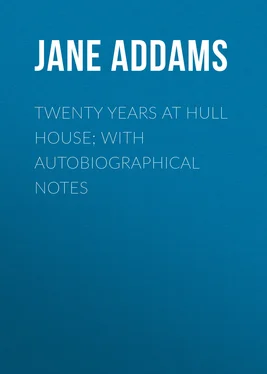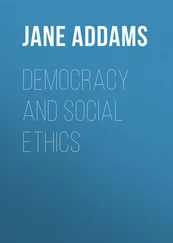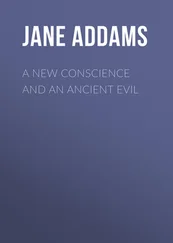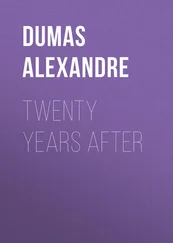Jane Addams - Twenty Years at Hull House; with Autobiographical Notes
Здесь есть возможность читать онлайн «Jane Addams - Twenty Years at Hull House; with Autobiographical Notes» — ознакомительный отрывок электронной книги совершенно бесплатно, а после прочтения отрывка купить полную версию. В некоторых случаях можно слушать аудио, скачать через торрент в формате fb2 и присутствует краткое содержание. Жанр: foreign_prose, История, foreign_edu, foreign_antique, на английском языке. Описание произведения, (предисловие) а так же отзывы посетителей доступны на портале библиотеки ЛибКат.
- Название:Twenty Years at Hull House; with Autobiographical Notes
- Автор:
- Жанр:
- Год:неизвестен
- ISBN:нет данных
- Рейтинг книги:5 / 5. Голосов: 1
-
Избранное:Добавить в избранное
- Отзывы:
-
Ваша оценка:
- 100
- 1
- 2
- 3
- 4
- 5
Twenty Years at Hull House; with Autobiographical Notes: краткое содержание, описание и аннотация
Предлагаем к чтению аннотацию, описание, краткое содержание или предисловие (зависит от того, что написал сам автор книги «Twenty Years at Hull House; with Autobiographical Notes»). Если вы не нашли необходимую информацию о книге — напишите в комментариях, мы постараемся отыскать её.
Twenty Years at Hull House; with Autobiographical Notes — читать онлайн ознакомительный отрывок
Ниже представлен текст книги, разбитый по страницам. Система сохранения места последней прочитанной страницы, позволяет с удобством читать онлайн бесплатно книгу «Twenty Years at Hull House; with Autobiographical Notes», без необходимости каждый раз заново искать на чём Вы остановились. Поставьте закладку, и сможете в любой момент перейти на страницу, на которой закончили чтение.
Интервал:
Закладка:
The largest sum of money that I ever ventured to spend in Europe was for an engraving of his "St. Hubert," the background of which was said to be from an original Durer plate. There is little doubt, I am afraid, that the background as well as the figures "were put in at a later date," but the purchase at least registered the high-water mark of my enthusiasm.
The wonder and beauty of Italy later brought healing and some relief to the paralyzing sense of the futility of all artistic and intellectual effort when disconnected from the ultimate test of the conduct it inspired. The serene and soothing touch of history also aroused old enthusiasms, although some of their manifestations were such as one smiles over more easily in retrospection than at the moment. I fancy that it was no smiling matter to several people in our party, whom I induced to walk for three miles in the hot sunshine beating down upon the Roman Campagna, that we might enter the Eternal City on foot through the Porta del Popolo, as pilgrims had done for centuries. To be sure, we had really entered Rome the night before, but the railroad station and the hotel might have been anywhere else, and we had been driven beyond the walls after breakfast and stranded at the very spot where the pilgrims always said "Ecco Roma," as they caught the first glimpse of St. Peter's dome. This melodramatic entrance into Rome, or rather pretended entrance, was the prelude to days of enchantment, and I returned to Europe two years later in order to spend a winter there and to carry out a great desire to systematically study the Catacombs. In spite of my distrust of "advantages" I was apparently not yet so cured but that I wanted more of them.
The two years which elapsed before I again found myself in Europe brought their inevitable changes. Family arrangements had so come about that I had spent three or four months of each of the intervening winters in Baltimore, where I seemed to have reached the nadir of my nervous depression and sense of maladjustment, in spite of my interest in the fascinating lectures given there by Lanciani of Rome, and a definite course of reading under the guidance of a Johns Hopkins lecturer upon the United Italy movement. In the latter I naturally encountered the influence of Mazzini, which was a source of great comfort to me, although perhaps I went too suddenly from a contemplation of his wonderful ethical and philosophical appeal to the workingmen of Italy, directly to the lecture rooms at Johns Hopkins University, for I was certainly much disillusioned at this time as to the effect of intellectual pursuits upon moral development.
The summers were spent in the old home in northern Illinois, and one Sunday morning I received the rite of baptism and became a member of the Presbyterian church in the village. At this time there was certainly no outside pressure pushing me towards such a decision, and at twenty-five one does not ordinarily take such a step from a mere desire to conform. While I was not conscious of any emotional "conversion," I took upon myself the outward expressions of the religious life with all humility and sincerity. It was doubtless true that I was
"Weary of myself and sick of asking
What I am and what I ought to be,"
and that various cherished safeguards and claims to self-dependence had been broken into by many piteous failures. But certainly I had been brought to the conclusion that "sincerely to give up one's conceit or hope of being good in one's own right is the only door to the Universe's deeper reaches." Perhaps the young clergyman recognized this as the test of the Christian temper, at any rate he required little assent to dogma or miracle, and assured me that while both the ministry and the officers of his church were obliged to subscribe to doctrines of well-known severity, the faith required to the laity was almost early Christian in its simplicity. I was conscious of no change from my childish acceptance of the teachings of the Gospels, but at this moment something persuasive within made me long for an outward symbol of fellowship, some bond of peace, some blessed spot where unity of spirit might claim right of way over all differences. There was also growing within me an almost passionate devotion to the ideals of democracy, and when in all history had these ideals been so thrillingly expressed as when the faith of the fisherman and the slave had been boldly opposed to the accepted moral belief that the well-being of a privileged few might justly be built upon the ignorance and sacrifice of the many? Who was I, with my dreams of universal fellowship, that I did not identify myself with the institutional statement of this belief, as it stood in the little village in which I was born, and without which testimony in each remote hamlet of Christendom it would be so easy for the world to slip back into the doctrines of selection and aristocracy?
In one of the intervening summers between these European journeys I visited a western state where I had formerly invested a sum of money in mortgages. I was much horrified by the wretched conditions among the farmers, which had resulted from a long period of drought, and one forlorn picture was fairly burned into my mind. A number of starved hogs—collateral for a promissory note—were huddled into an open pen. Their backs were humped in a curious, camel-like fashion, and they were devouring one of their own number, the latest victim of absolute starvation or possibly merely the one least able to defend himself against their voracious hunger. The farmer's wife looked on indifferently, a picture of despair as she stood in the door of the bare, crude house, and the two children behind her, whom she vainly tried to keep out of sight, continually thrust forward their faces almost covered by masses of coarse, sunburned hair, and their little bare feet so black, so hard, the great cracks so filled with dust that they looked like flattened hoofs. The children could not be compared to anything so joyous as satyrs, although they appeared but half-human. It seemed to me quite impossible to receive interest from mortgages placed upon farms which might at any season be reduced to such conditions, and with great inconvenience to my agent and doubtless with hardship to the farmers, as speedily as possible I withdrew all my investment. But something had to be done with the money, and in my reaction against unseen horrors I bought a farm near my native village and also a flock of innocent-looking sheep. My partner in the enterprise had not chosen the shepherd's lot as a permanent occupation, but hoped to speedily finish his college course upon half the proceeds of our venture. This pastoral enterprise still seems to me to have been essentially sound, both economically and morally, but perhaps one partner depended too much upon the impeccability of her motives and the other found himself too preoccupied with study to know that it is not a real kindness to bed a sheepfold with straw, for certainly the venture ended in a spectacle scarcely less harrowing than the memory it was designed to obliterate. At least the sight of two hundred sheep with four rotting hoofs each, was not reassuring to one whose conscience craved economic peace. A fortunate series of sales of mutton, wool, and farm enabled the partners to end the enterprise without loss, and they passed on, one to college and the other to Europe, if not wiser, certainly sadder for the experience.
It was during this second journey to Europe that I attended a meeting of the London match girls who were on strike and who met daily under the leadership of well-known labor men of London. The low wages that were reported at the meetings, the phossy jaw which was described and occasionally exhibited, the appearance of the girls themselves I did not, curiously enough, in any wise connect with what was called the labor movement, nor did I understand the efforts of the London trades-unionists, concerning whom I held the vaguest notions. But of course this impression of human misery was added to the others which were already making me so wretched. I think that up to this time I was still filled with the sense which Wells describes in one of his young characters, that somewhere in Church or State are a body of authoritative people who will put things to rights as soon as they really know what is wrong. Such a young person persistently believes that behind all suffering, behind sin and want, must lie redeeming magnanimity. He may imagine the world to be tragic and terrible, but it never for an instant occurs to him that it may be contemptible or squalid or self-seeking. Apparently I looked upon the efforts of the trades-unionists as I did upon those of Frederic Harrison and the Positivists whom I heard the next Sunday in Newton Hall, as a manifestation of "loyalty to humanity" and an attempt to aid in its progress. I was enormously interested in the Positivists during these European years; I imagined that their philosophical conception of man's religious development might include all expressions of that for which so many ages of men have struggled and aspired. I vaguely hoped for this universal comity when I stood in Stonehenge, on the Acropolis in Athens, or in the Sistine Chapel in the Vatican. But never did I so desire it as in the cathedrals of Winchester, Notre Dame, Amiens. One winter's day I traveled from Munich to Ulm because I imagined from what the art books said that the cathedral hoarded a medieval statement of the Positivists' final synthesis, prefiguring their conception of a "Supreme Humanity."
Читать дальшеИнтервал:
Закладка:
Похожие книги на «Twenty Years at Hull House; with Autobiographical Notes»
Представляем Вашему вниманию похожие книги на «Twenty Years at Hull House; with Autobiographical Notes» списком для выбора. Мы отобрали схожую по названию и смыслу литературу в надежде предоставить читателям больше вариантов отыскать новые, интересные, ещё непрочитанные произведения.
Обсуждение, отзывы о книге «Twenty Years at Hull House; with Autobiographical Notes» и просто собственные мнения читателей. Оставьте ваши комментарии, напишите, что Вы думаете о произведении, его смысле или главных героях. Укажите что конкретно понравилось, а что нет, и почему Вы так считаете.





![О Генри - Через двадцать лет [After Twenty Years]](/books/415401/o-genri-cherez-dvadcat-let-after-twenty-years-thumb.webp)






